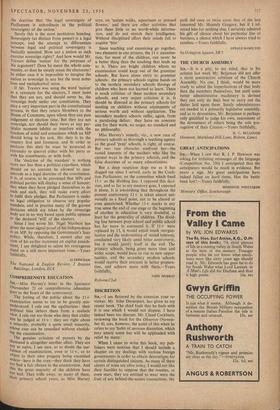COMPREHENSIVE EDUCATION
Sta,—Miss Harvey's letter in the Spectator (November 2) on comprehensive education goes to the heart of the controversy.
The feeling of the public about the 11+ examination seems to me to be grossly mis- understood. I rule out the egalitarians : their Political bias debars them from a realistic view. 1 rule out too those who deny that ability can be judged at 11+ : they are right about a minority, probably a quite small minority, whose case can be remedied without abolish- ing the examination.
The genuine criticism of parents by the thousand is altogether another affair. They are not so naive, I am sure, as to doubt the use- fulness of examinations, even at 11+, or to Object to their own progeny being examined unless—here is the crux—they think they.have not had a fair chance in the examination. And this the great majority of the children have not had. They trifle away, so many of them, their primary school years, as Miss Harvey
says, on 'nature walks, aquariums or pressed flowers,' and there are other activities that give them little or no worth-while informa- tion, and do not stretch their intelligence. Without disciplined effort their minds fail to acquire 'bite.'
Since teaching and examining go together, two elements in one process, the 11+ examina- tion, for most of the children, can never be a better thing than the teaching that leads up to it. There are bright children whom no examination could keep out of the grammar schools., But leave alone entry to grammar schools: the primary schools regime hands on to the modern secondary schools throngs of children who have not learned to learn. There is much criticism of these modern secondary schools, and very unjust criticism it is. It should be directed at the primary schools for sending on children without attainments of serious worth and without application. The secondary modern schools suffer, again, from a paralysing defect: they have no concrete aim for their work, no target, no standard and no philosophy.
Miss Harvey's remedy, viz., a new race of primary schools as thorough a teaching agency as the good 'prep' schools, is right, of course. But two vast obstacles confront her--=the vested interests of the teachers who like the current ways in the primary schools, and the false doctrines of so many educationists.
But a deep suspicion dogs me as it has dogged me since I served, early in the Coali- tion Parliament, on the committee which fixed 11+ as the dividing line. I opposed this deci- sion, and so far as my memory goes, I opposed it alone. It is astonishing that throughout the present controversy 11+ is taken almost uni- versally as a fixed point, not to be altered or even questioned. Whether 11+ marks in any true sense the end of one stage or the beginning of another in education is very doubtful, at least for the generality of children. The divid- ing line between prep school and public school has far more fo commend it. If 11+ were replaced by 13, it would entail much reorgan- isation and the undermining of vested interests, conducted very likely amid bitter controversy, but it would justify itself in the end. The primary schools, being given more time and wider scope, would have to rise to new oppor- tunities, and the secondary modern schools would receive their entrants in better prepara- tion, and achieve more with them.—Yours faithfully,
JOHN MURRAY










































































 Previous page
Previous page